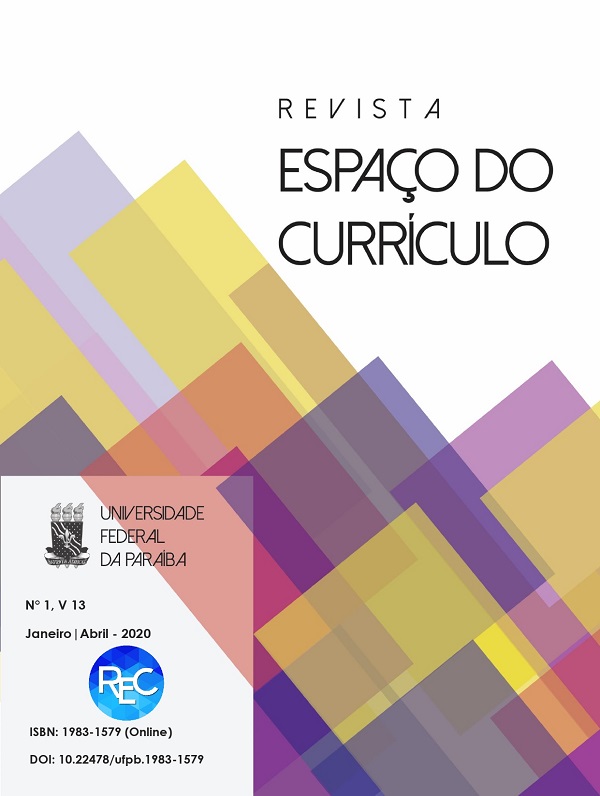INTERCULTURALITY AS AN EMERGING DISCOURSE IN THE CURRICULAR REFORMS OF MEXICAN BASIC EDUCATION
DOI:
https://doi.org/10.22478/ufpb.1983-1579.2020v13n1.51546Keywords:
Basic Education, Interculturality, Curriculum ReformAbstract
This paper addresses the discussion related to the discourse’s emergence of interculturality within the Mexican basic education curricular reforms from 1993 to 2017. This analysis retakes the horizon of intellection from Foucault’s category of genealogy (1988) in which the notions of origin, invention, provenance and emergence allow us to interpret the historical political evolution of such discourse. From this theoretical approach, the curricular reforms in question are analyzed, as well as the discourse of intercultural education as an educational policy, focusing attention on the folds and margins that this emergency supposed, as well as the disputes and controversies in this regard. The intention is to problematize the assumption that places interculturality as a disruptive element for the epistemic dimension of curricular reforms. However, given the hegemony (Laclau, 1987) of the logic of the educational sciences in these reforms, their incorporation into the curriculum National was weak and eventually displaced.
Downloads
Metrics
References
ARDITI, Benjamín. Rastreando lo político. En Revista de estudios políticos, núm. 87, enero-marzo de 1995, p. 333-351.
BUENFIL, Rosa Nidia. Análisis de discurso y educación. México: Departamento de Investigaciones Educativas-CINVESTAV. COLL, César, POZO, J., SARABIA, B. y VALLS, E. Los contenidos en la reforma. Barcelona: Santillana-Aula XXI.1994.
DE ALBA, Alicia. Teoría y educación: en torno al carácter científico de la educación. México: Centro de Estudios sobre la Universidad de la UNAM, 1990.
DE ALBA, Alicia. Curriculum: crisis, mito y perspectivas. México: Centro de Estudios sobre la Universidad de la UNAM, 1991.
DE ALBA, Alicia. Curriculum universitario. Académicos y futuro. México: UNAM/ Plaza y Valdés, 2002.
DÍAZ BARRIGA, Ángel. La educación en valores: Avatares del curriculum formal, oculto y los temas transversales. En Revista Electrónica de Investigación Educativa. 2006. Núm. 1, vol. 8, pp. 1-15. Consultado el día 12 de marzo de 2020 en: <http://redie.uabc.mx/vol8no1/contenido-iazbarriga2.html>.
DÍAZ BARRIGA, Ángel y GARCÍA GARDUÑO, José María. Desarrollo del curriculum en América Latina: experiencias en 10 países. Buenos Aires: Miño y Dávila, 2014.
Follari, Roberto. Filosofía y educación: nuevas modalidades de una vieja relación. En DE ALBA, Alicia. Teoría y educación: en torno al carácter científico de la educación. México: Centro de Estudios sobre la Universidad de la UNAM, 1990. p.66-77.
FOUCAULT, Michel. Nietzche, la genealogía, la historia. Valencia: Pre-textos, 1988.
FOUCAULT, Michel. La verdad y las formas jurídicas. Barcelona: Gedisa editorial, 1996.
FURLÁN, Alfredo. Ideología del discurso curricular. México: Universidad Autónoma de Sinaloa / Universidad Nacional Autónoma de México, 1997.
GALLARDO, Ana Laura. Racismo y discriminación en el sistema educativo mexicano. Claves desde las reformas a la educación básica nacional en el siglo XXI (2006 y 2011). Tesis de doctorado. 2014. Programa de maestría y doctorado en Pedagogía, Universidad Nacional Autónoma de México, México, 2014.
GOBIERNO FEDERAL. Acuerdos de San Andrés Larráinzar: derechos y cultura indígena. México: Diario Oficial de la Federación, 1996.
HABERMAS, Jürguen. Conocimiento e interés. Madrid: Taurus, 1982. JUÁREZ, Benito. Manifiesto a la Nación. México: s/r, 1859.
LACLAU, Ernesto y MOUFFE, Chantal. Hegemonía y estrategia socialista: hacia una radicalización de la democracia. Madrid: Siglo XXI,1987.
LATAPÍ, Pablo. La moral regresa a la escuela. México: CESU-UNAM, 1999. NIETZCHE, Friedrich. Genealogía de la moral. Madrid: Alianza, 2011.
OROZCO, Bertha. El cambio curricular en la facultad de enfermería de la UASLP. Una mirada a su historia discontinua. Tesis de doctorado. 2015. Programa de maestría y doctorado en Pedagogía, Universidad Nacional Autónoma de México, México, 2015.
PND. Plan Nacional de Desarrollo 2019-2024. México: Gobierno de la República, 2019.
POPKEWTIZ, Thomas. Sociología política de las reformas educativas. Madrid: Morata, 1991.
PUIGGRÓS, Adriana. Modernidad, posmodernidad y educación en América Latina. En De Alba, Alicia (comp.). Posmodernidad y educación. México: Centro de Estudios sobre la Universidad, 1995, p. 178-202.
SÁNCHEZ PUENTES, Ricardo. La investigación científica en ciencias sociales (Estructura dialogal, campo de lucha ideológica y factor del proyecto ético-político de una comunidad). En Revista Mexicana de Sociología. Vol. 46, No. 1, ne.-Mar., 1984, p. 129-160.
SCHMELKES, Sylvia. La formación de valores en la educación básica. México: SEP, 2004.
SECRETARÍA DE EDUCACIÓN PÚBLICA (SEP). Acuerdo Nacional para la Modernización Educativa. México: SEP, 1992.
SECRETARÍA DE EDUCACIÓN PÚBLICA (SEP). Modelo educativo. Primaria. México: SEP, 1993.
SECRETARÍA DE EDUCACIÓN PÚBLICA (SEP). Programa Sectorial de Educación 2007-2012. México: SEP, 2006.
SECRETARÍA DE EDUCACIÓN PÚBLICA (SEP). Acuerdo Secretarial 384 por el que se establece el nuevo Plan y Programas de Estudio para Educación Secundaria. México: Diario Oficial de la Federación, 2006a.
SECRETARÍA DE EDUCACIÓN PÚBLICA (SEP). Plan de estudios 2011: Educación Básica. México: Dirección General de Desarrollo Curricular, 2011.
SEGOB. Constitución Política de los Estados Unidos Mexicanos. México: Secretaría de Gobernación, 2019.
TABA, Hilda. Elaboración del currículo, teoría y práctica. Buenos Aires: Troquel, 1976.
TYLER, Ralph. Principios básicos del currículo. Buenos Aires: Troquel, 1973.
Downloads
Published
How to Cite
Issue
Section
License
By submitting an article to Curriculum Space Journal (CSJ) and having it approved, the authors agree to assign, without remuneration, the following rights to Curriculum Space Journal: first publication rights and permission for CSJ to redistribute this article. article and its metadata to the indexing and reference services that its editors deem appropriate.
















